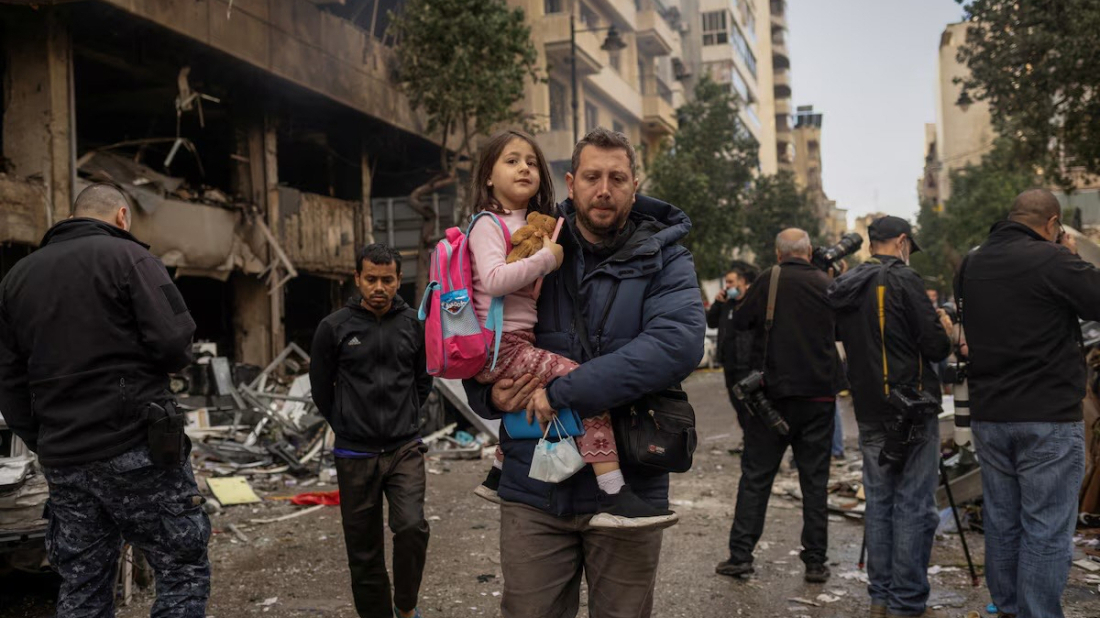Pentagon threatens to label Anthropic ‘supply chain risk’ over AI limits
The Pentagon has threatened to designate artificial intelligence firm Anthropic as a “supply chain risk” amid a dispute over the military use of i...

An Israeli airstrike in central Beirut killed five people and wounded 31 on Monday, marking the second consecutive day of strikes in the city. The attack comes as Lebanon and Hezbollah agree to a U.S.-proposed ceasefire with Israel. Tel Aviv is yet to respond.
An Israeli airstrike in central Beirut on Monday killed at least five people, marking the second consecutive day of Israeli bombardment in the Lebanese capital. The attack targeted the densely populated Zuqaq al-Blat neighborhood, close to the Lebanese government’s headquarters. Lebanon’s health ministry confirmed that 31 others were injured, with two more individuals reported missing. At least 3,500 people have been killed in Lebanon so far according to reports.
Over the past week, Israel has escalated its airstrikes in and around Beirut, while Hezbollah has launched several rocket and drone attacks targeting Israeli military sites.
As the fighting rages on, Lebanon and Hezbollah have agreed to a U.S.-led ceasefire proposal with Israel a top Lebanese official told Reuters on Monday, describing the effort as the most serious yet to end the fighting.
Ali Hassan Khalil, an aide to Parliament Speaker Nabih Berri, said Lebanon had delivered its written response to the U.S. ambassador in Lebanon on Monday, and White House envoy Amos Hochstein was travelling to Beirut to continue talks.
"Lebanon presented its comments on the paper in a positive atmosphere," Khalil said, declining to give further details. "All the comments that we presented affirm the precise adherence to (U.N.) Resolution 1701 with all its provisions," he said.
There was no immediate comment from Israel.
However, a diplomat familiar with the negotiations warned that final details still need to be resolved, which could delay a full agreement. The ceasefire plan is expected to align with U.N. Security Council Resolution 1701, which brought an end to the 2006 war between Israel and Hezbollah. The resolution mandates Hezbollah to relocate its fighters and weapons north of the Litani River, about 30 kilometers from the Israeli border.
Israel’s recent operations began in late September, following a year of escalating hostilities with Hezbollah. The Israeli military has focused on dismantling Hezbollah’s capabilities, conducting airstrikes across Lebanon, and deploying ground forces in southern Lebanon. In the latest escalation, Israel’s airstrikes on Beirut on Sunday killed 10 people, including a senior Hezbollah media official.
On Monday, a rocket fired from Lebanon struck a building in the Israeli town of Shfaram, killing an Israeli citizen. The Israeli military confirmed that at least five rockets were fired from Lebanon.
The international community has called for an immediate ceasefire, with hopes for a diplomatic resolution as both sides remain entrenched in the ongoing conflict.
U.S. Ambassador to NATO Matthew Whitaker said China has the power to bring an end to Russia’s war in Ukraine, arguing that Beijing is enabling Moscow’s military campaign.
Austria’s Janine Flock won the gold medal in the women’s skeleton event at the Milano-Cortina 2026 Winter Olympics on Saturday.
Iran’s Supreme National Security Council Secretary Ali Larijani said the United States could evaluate its own interests separately from those of Israel in ongoing negotiations between Tehran and Washington.
U.S. Secretary of State Marco Rubio on Sunday (15 February) called it “troubling” a report by five European allies blaming Russia for killing late Kremlin critic Alexei Navalny using a toxin from poison dart frogs.
Ukrainian President Volodymyr Zelenskyy said on Saturday that Russia’s decision to change the leadership of its delegation for upcoming peace talks in Geneva appeared to be an attempt to delay progress.
The Pentagon has threatened to designate artificial intelligence firm Anthropic as a “supply chain risk” amid a dispute over the military use of its Claude AI model, according to a report published Monday.
Representatives of Ukraine, Russia and the United States are set to meet in Geneva for a third round of trilateral negotiations aimed at ending the nearly four-year war, even as both sides intensify military pressure on the ground.
The Prime Minister, Mark Carney, announced on 16 February that the Honourable Janice Charette has been appointed as the next Chief Trade Negotiator to the United States.
Cuba’s fuel crisis has turned into a waste crisis, with garbage piling up on most street corners in Havana as many collection trucks lack enough petrol to operate.
Day 10 of the Milano Cortina 2026 Winter Olympics delivered high-stakes semifinals, dramatic finishes and classic podium moments across Milan and the Italian Alps. Photographers captured split seconds of symmetry before puck drops, explosive turns on the ice and triumphant celebrations.
You can download the AnewZ application from Play Store and the App Store.

What is your opinion on this topic?
Leave the first comment